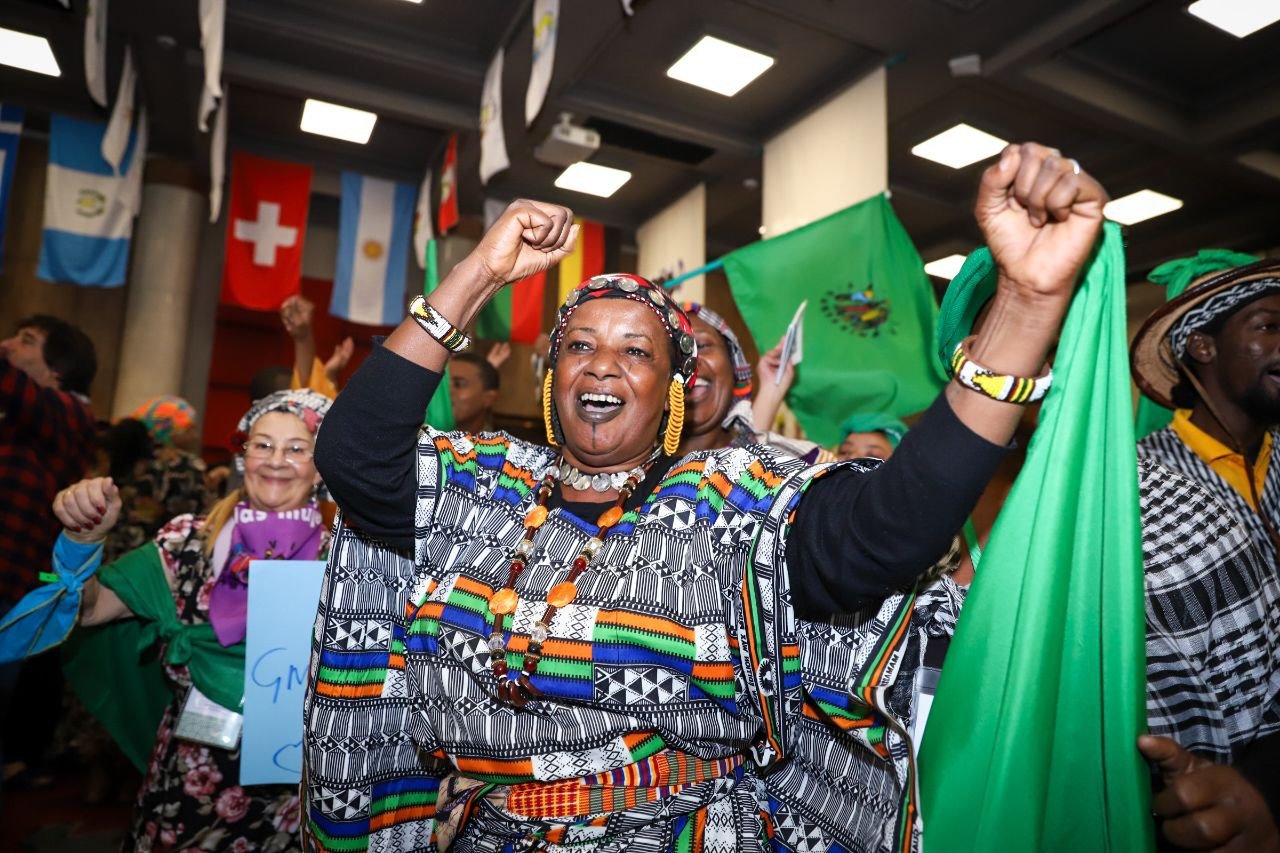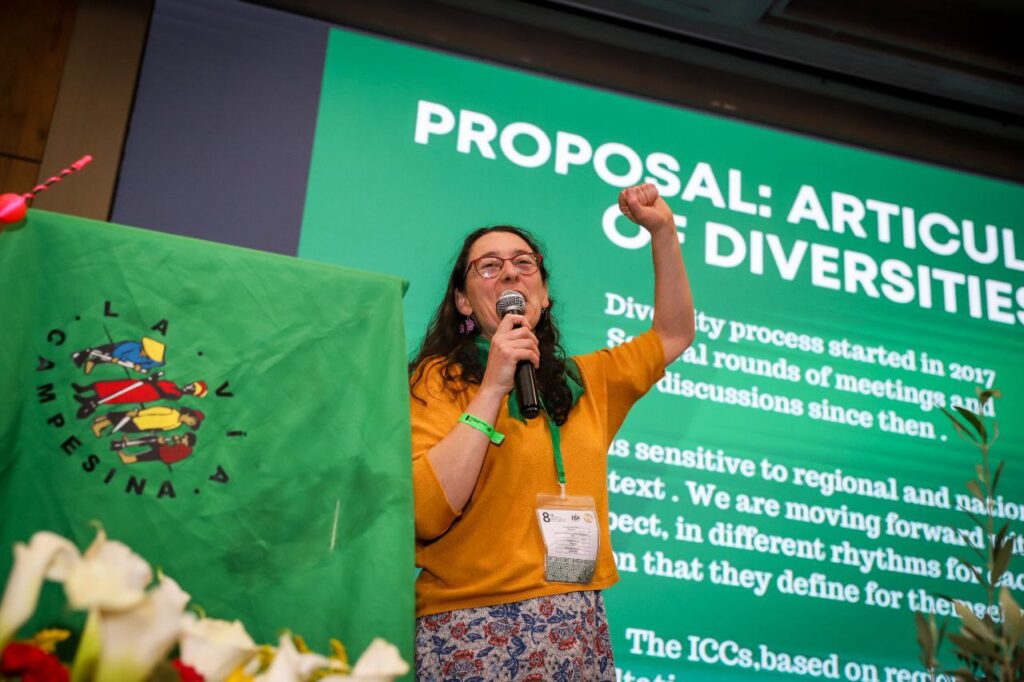“Food sovereignty is to defend nature, to defend water, to defend our planet”

The 8th International Conference of La Via Campesina is a space for critical reflection on the structural forces creating and perpetuating global crises. It is a powerful convening to strengthen connections between grassroots movements that are building alternative societies in the present. On Tuesday December 5th, the morning’s first session offered an incredibly powerful moment for political education, in which activists from around the world had the opportunity to deepen their understanding of the contradictions conditioning food systems, and grassroots strategies of resistance.

João Pedro Stedile, who is a national leader within Brazil’s Landless Workers’ Movement (MST), offered a forceful analysis of the present conjuncture, as well as potential for grassroots resistance. Stedile presented a holistic analysis of food sovereignty, highlighting as a starting point that food cannot be a commodity. Food sovereignty, for Stedile, is predicated on people producing their own food, but it’s about more than that. “Food sovereignty is to defend nature, to defend water, to defend our planet. Within food sovereignty, we incorporate respect for life, for human life, animal life, plant life as a foundational principle; we incorporate critical questions of gender, to ensure that our female comrades can be actively engaged in each of our struggles.
One of the key values of the International Conference, Stedile underscored, is the ability to learn directly from comrades’ own critical analyses of their regional context. “The presentations from yesterday helped us to understand the class struggle in the world, we learned from our comrades the critical challenges in their regions.”
Like other speakers throughout the Conference, Stedile emphasized the gravity of climate change. “There is a grave environmental crisis that affects the entire planet, that threatens all humanity, and all plants, animals, and other species. And this crisis is the product of the aggression of capital. Billions of people can live in equilibrium with nature. But we need to be clear that the cause of the crisis is the nature of capital.”
Stedile then moved from an analysis of capital’s role in pushing peasants off the land, and underdevelopment, to exploring the key positions of the movement. “Over the last 30 years we’ve been able to build something truly important.” Several of the factors that Stedile underscored were the centrality of agrarian reform. “It’s not just about reclaiming land. We’re talking about integrated agrarian reform, which is territorial, and popular. So it’s not just defending land, it’s defending water, air, nature. Another crucial advance has been LVC’s articulation of food sovereignty. “It’s not just a matter of providing food for people; we need healthy food, and so we need to combat transgenic seeds and pesticides. Because healthy food is the energy of life. People who don’t produce their own food will be slaves.” Closely linked to food sovereignty, for Stedile, is the massification of agroecology. “Our agroecology is being scaled up in every territory – this involves the control of seeds, the production of alternative medicines, creating agroecological schools in every country. We need an Instituto Latinoamericano de Agroecología (IALA ) in each country, in each region. In terms of the theme of agroecology, we are incredibly proud of our women, who help us to understand that agroecology is a feminist action, that saving seeds is a feminist action, and so our female comrades are protagonists in this struggle.” Stedile ended by connecting the climate crisis to the need for energy sovereignty. “We need to take control over renewable technologies. We have to dominate the techniques through which the peasants can control solar power and use it to advance agroecology. There are already some who are using solar panels to run tractors. We need to be able to employ renewable energy to power our farms, because it is only with control over production that we will succeed.”

Following Stedile, Jaime Amorim, an member of the International Coordinating Committee (ICC) of La Via Campesina and MST in Brazil, began by emphasizing the importance of a conjunctural analysis. “We can’t interpret reality with incorrect data; we can’t have a critical analysis that makes us weak. To define tactics, to create a strategy for the future, we need to study and to interpret our reality, and we’ve done this. And so now we need to develop a plan for the articulation of the next period.”
Amorim focused on elaborating the nature and principles of La Via Campesina, because it is these that should guide the articulation of the plan of action for the next period.
“First, we live in a critical period of rapid changes in the environment and the political landscapes. The increase in economic inequality, the attack on rural peoples, the barbarity and the violence. The environmental crisis represents a fundamental threat to humanity. We say that when we plant a tree, we plant water. We have the historic role of shifting our relationship with the land.”
He also added that “We need to give centrality to the plan that we are putting forth. Instead of progressing incrementally from isolated, small-scale experiments on a single farm, we must swiftly orient our efforts towards the broader perspectives of agroecology and agroforestry. And if we don’t, we’ll be missing this historic moment, and will be knocked down in the context of the global climate crisis.”
He then enumerated and expanded upon LVC’s organizational principles, which include internationalism among different grassroots movements, promoting exchange and knowledge of one another’s realities. Solidarity, which is a fundamental human value, involves releasing from the ego’s grasp and creating a collective project together. Building financial autonomy, which is critical for grassroots movements, and revolves around developing political projects outside of the control of financial institutions. He then elaborated on the organizational principles, including the importance of collective leadership, division of tasks, participatory democracy, discipline, gender equality, youth participation, and ongoing evaluation.
Amorim reminded the hundreds of activists in the audience that “what we propose is to create a new world that is anti-capitalist. Globalize the struggle!” he called out to the crowd, to which the audience offered a deafening response “globalize hope!” He continued, “With our political and organizational principles we will overcome this unequal society, and replace it with a society that is based in equity.”

Morgan Ody, LVC’s General Coordinator and a member of Confédération Paysanne in France, then expanded on the political education process by providing a snapshot of the movement from the perspective of the ICC. Reflecting upon the organizational structure of the movement, she highlighted how LVC is organized under 10 regions, a collective construction that began in 2004. Ody underscored the importance of this global congress, emphasizing that the International Conference is the highest decision-making space in the movement.
As part of her discussion, she offered that the movement was poised to increase the representation and coordination of youth now that the ICC will include – instead of one youth per continent – one per region, to which there was a resounding applause. She then reviewed the function and composition of the ICC, emphasizing its consensus-based decision-making process. She also explained the process through which new members, such as the Australian Food Sovereignty Alliance, are integrated in the movement, and how they are key in helping to build out regions, in this case in the Pacific Ocean. Morgan discussed the formative processes within LVC, and then put forward a proposal which has been many years in the making: the articulation of the diversities, to which the gathered activists chanted “With diversity, we have revolution.” She ended by emphasizing that this movement is one of ongoing construction, and that while the road ahead is filled with challenges, it is also brimming with hope.
This post is also available in Français.
